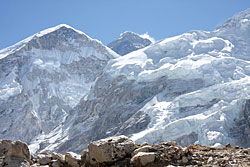|
|
| IRON CURTAIN: A temporary police checkpoint near Everest Base Camp where expedition gear is checked for pro-Tibet flags and material. All video cameras, satellite phones have to be surrendered. |
The ice pillars on the Khumbu glacier sparkled. The seracs on the Nuptse wall were blue-green and translucent.
We felt elated despite the 5,000m elevation as we walked towards Base Camp on Monday. Both the army and a trekking company had assured us as reporters we might be able to seek exemption from the ban on satellite phones and video cameras.
But minutes after arriving at Base Camp and being escorted to a temporary post by a friendly plainclothes policeman, Deputy Secretary of the Tourism Ministry Prabodh Dhakal took charge of us. "You are not allowed to talk to any one here," he said sternly. "If anyone is found talking to you, they will be expelled."
No journalist was allowed to enter Base Camp without a permit. "You are also unofficial here, so leave this place as soon as possible," Dhakal told us.
The government has ordered an information blackout at Everest Base Camp. Not only video cameras and satellite phones, but also satellite internet and walkie-talkies, essential for mountain rescue, have been confiscated. We were told we could not even cover non-political subjects.
When I asked why I, as a Nepali, could not stay, Dhakal said repeatedly that these were "exceptional circumstances". He told us to come back after the Olympic Torch had reached the summit via the Chinese side.
"You have heard that Chinese officials have been meeting the Prime Minister and other government officials. It's an order from the top. You are not allowed to stay here: you don't have a permit," he said.
This Base Camp is on the Nepal side of the mountain, but it might as well be in China. Nepal has officially closed the southern side of Chomolungma until at least 10 May from Camp 2 (6,500 m) upwards. In addition, all foreigners without a climbing permits have been ordered to leave Base Camp from 1-4 May. That includes photographers, team leaders and spouses of climbers.
As a Nepali I felt sad and humiliated. A Nepali mountaineering official, who didn't want to be named, explained: "Nepal is a beggar country. We are getting lots of economic help from China, so we can't jeopardise our relationship." But it's not just geopolitics, mountaineers' lives are also at risk. A climber at Base Camp who also didn't want to be quoted, fearing expulsion, said that the longer the mountain was closed, the greater was the danger. "Within 10 days, we could have made Camp 4 ready for the first summit push," he said. "But the longer the closure, the greater the danger of ice falling on us. It's endangering our lives."
The reason for all this bandobast is that China doesn't want any embarrassing Free Tibet banners at Base Camp or on the mountain during the torch's journey to the summit. Chinese ambassador Zheng Xianling flew into Base Camp this week in an army helicopter. The police had found a Free Tibet flag in the rucksack of an American mountaineer, he was sent down the mountain and later deported.
There is anger along the Everest Trail for the decline in business and employment this season. Dendi Sherpa, a lodge owner, said the restrictions were a sign of the Nepal government's weakness. "It's China that is holding the Olympics-why should we have to close all these things?" asked Dendi. Trekkers are also unhappy they aren't allowed to use video cameras near Base Camp.
The Rinpoche of Tengboche Monastery has said he was "extremely worried" that the home ministry had sent armed soldiers to Chomolungma. But for Major D B Thapa in Namche, it is clear Nepal can't jeopardise relations with China. He said: "We want the Olympic Torch to reach the top of Sagarmatha successfully."
Torch nearing summit
|
|
The Chinese took the Olympic Torch to the summit of Mt Everest on May Day itself in an expedition that has been shrouded in secrecy.
The Olympic flame arrived in Hong Kong on Wednesday. Another torch was taken to the north Base Camp last week and is said to be making its way to the top. The Olympic flame split in Beijing last month, with the main torch heading to Europe, the United States and Asia on its protest-marked world tour.
Western reporters at the Rongbuk Glacier on the north side of Everest have said there is no information about the torch. The flame will be carried in a lantern, allowing a carefully designed torch using special fuel to be lit in the thin air of the summit.
Some had speculated that the team hoped to make the ascent Wednesday, exactly 100 days before the Olympics and amid celebrations in Beijing. The torch may have been delayed because of gale force winds at the summit this week.
There has been Chinese air activity over the summit on Tuesday and Wednesday which could indicate the torch is nearing the summit. Chinese CCTV reported mountaineers had completed the setup of a staging point at 8,300m for the final assault on the 8,850m summit.




